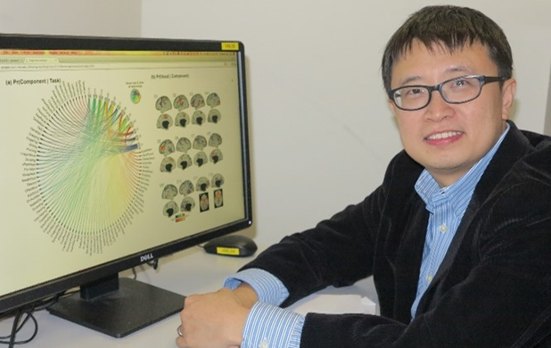内容来源: OpenScience
Large-scale brain networks are collections of widespread brain regions showing functional connectivity, and are providing a coherent framework for understanding mental processes by offering a neural model of how different mental states or cognitive functions emerge when different sets of brain regions join together as self-organized coalitions. In recent decades, large-scale brain networks were frequently reported to be beneficial in understanding human behaviors and disease mechanisms, as well as be predictive for mental health or behavioral patters. In this talk, Prof Thomas Yeo will share his comprehensive work regarding the large-scale networks, relavent application with predictive modeling, and the optimization potentials.
报告信息
题目:Organization of Large-Scale Networks in the Human Cerebral Cortex
报告语言:English
分享嘉宾:B.T. Thomas Yeo, Associate Professor, National University of Singapore

Thomas is currently an Associate Professor at the National University of Singapore (NUS) Centre for Sleep & Cognition, Centre for Translational MR Research, Department of Electrical and Computer Engineering, N.1. Institute for Health and Institute for Digital Medicine. Thomas’ group develops machine learning algorithms to automatically generate scientific discoveries from large-scale datasets comprising thousands of subjects with brain MRI, behavioral, genetic and other physiological measures. By exploring large multi-modal datasets, Thomas seeks to discover fundamental principles of brain network organization, how brain networks are organized to support cognition and how brain networks are disrupted in mental disorders.
More details on Thomas could be found at https://sites.google.com/view/yeolab.
摘要
The human brain is a complex system exhibiting multi-scale spatiotemporal organization. In this talk, I will first discuss the topography of large-scale brain networks at both the population-level and in individuals. I will then discuss the prediction of behavioral traits from large-scale network features. Finally, I will discuss the use of biophysical models combined with modern optimization techniques to bridge the gap between macro-scale brain MRI with micro-scale brain organization.
时间
- 北京时间[GMT+8] 9月14日(周三) 21:00~22:00
- 欧洲中部时间[CEST] 9月14日(周三) 15:00~16:00
- 美国东部时间[EDT] 9月14日(周三) 09:00~10:00
zoom信息 Meeting ID: 9139 4010 836
报告流程:报告45分钟,提问15分钟
主持人:张晗 (A*STAR, Singapore)
其它:本次线上报告录屏会在结束后上传于B站:OpenScience_CN https://space.bilibili.com/252509184
组织团队(按名字首字母倒序排列)
COSN 学术策划小组
张晗(博士), A*STAR, Singapore
张磊(博士), University of Vienna, Austria
楊毓芳(博士), Freie Universität Berlin, Germany
杨金骉, MPI Psycholinguistics, the Netherlands
徐婷(博士), Child Mind Institute, USA
肖钦予, University of Vienna, Austria
刘泉影(博士), 南方科技大学
王鑫迪(博士), 北京慧脑云
王庆(博士), 上海精神卫生中心
金淑娴, Vrije Universiteit Amsterdam, the Netherlands
金海洋(博士), New York University Abu Dhabi, UAE
胡传鹏(博士), 南京师范大学
葛鉴桥 (博士), 北京大学
高梦宇(博士), 北京师范大学
耿海洋(博士), 天桥脑科学研究院
陈志毅(博士), 第三军医大学
陈妍秀(博士), 中科院心理所
陈骥(博士), 浙江大学
曹淼(博士), 北京大学
neurochat团队
张文昊(UT Southwestern Medical Center, USA)
张洳源(上海交通大学)
张磊(University of Vienna, AUT)
应浩江(苏州大学)
徐婷(Child Mind Institute, USA)
王鑫迪(北京慧脑云)
滕相斌(MPI for Human Development, DEU)
鲁彬(中国科学院心理研究所)
孔祥祯(浙江大学)
胡传鹏(南京师范大学)
邸新(New Jersey Institute of Technology, USA)